“Terrorism is the war of the poor, and war is the terrorism of the rich.”
Peter Ustinov
‘War is a moral contest and they are won in the temples before ever fought.’
Sun Tzu
There is hardly such a thing as a war in which it makes no difference who wins. Nearly always one side stands more or less for progress, the other side more or less for reaction.
George Orwell
My mistrust for authority deepening, I would navigate a much stonier moral path: the lines between good and evil would appear to me less easy to discern, and my idea of culpability was not limited to those deemed by the state as criminals or suspects. It included elements of the state itself. Everything I thought I knew about my society had been turned upside down and inside out.
John Lennon said it as it was: ‘You can’t be silent about anything’. Having been slow off the mark, I changed my tune, backpedalling furiously, making a 180 degrees about face. Having flipped around, I came out loud, thick and fast in no uncertain terms, in different company, not a different one,speaking my mind. Running with the hares, not the hounds.
Australia’s sending boots on the ground was accompanied with superficial rhetoric about defending democracy and humanitarian ideal in South Vietnam. It was ruled by a succession of dictatorial and corrupt client regimes representing the landowning elite, siphoning off aid, paying off under the table, overturning land reform, demanding that peasants give up land and pay heavy back taxes to their former landlords. The Vietnamese people did not choose the various governments that the USA imposed on them. There was widespread support for the North Vietnamese Army.
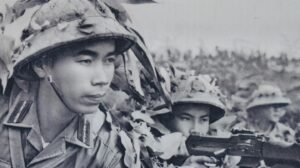
Likewise for the home-grown guerrilla National Liberation Front. Some apologists may have continued to believe the rhetoric but it was nothing more than fantasy.
‘You can package the fable any way you want’, said Russel — the simple reality is that Kennedy approved escalation of the U.S. military advisory effort in Vietnam to direct U.S. involvement in combat operations.’
‘He said he was acting pursuant to the Geneva Accords of 1954.’
‘Geneva Accords, my foot! It was in flagrant violation of them. He encouraged a coup against the Diem regime that opened a Pandora’s box of turmoil, dramatically elevating U.S. political responsibility for South Vietnam’s fate.
Most of the explanations of Australia’s involvement in the war were nationalist in the sense that they assessed developments against a criterion of the interests of ‘Australia’, understood as the common interests of all or most of the people living here. There were different views about what those interests were. But nationalist perspectives all identified Australian interests that were above or could unite classes. For the conservatives the nation and individuals were units of analysis, not class.
‘This is the greatest lie they try to stuff down our throats,’ Russel Ward said to me, ‘that Australia is one, that our nation is one, and that we are all one people, united in our beliefs with one common interest.’ But do you think the interests of a child in the slum of Redfern are the same as those of his family’s rack-renting landlord? Do you think the interests of a farm labourer are the same as his squattocrat boss?’
‘Not the ones I know.’
‘Do you think the interests of a miner or a factory worker the same as the owner’s, his bankers, his lawyers’, his investors’ and the prostitute journalists hired to weave their web of lies?
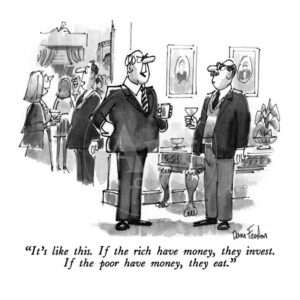
Do you think they give a damn about our old, the sick, the unemployed, the poorly fed, and the homeless.’
‘Not by a long shot. Yet we are being told all the time we must be proud to be Australians.’
‘Pride should be reserved for something you achieve or obtain on your own, not something that happens by accident of birth. Being Australian isn’t a skill. It’s a genetic accident. You wouldn’t say ‘I’m proud to be six feet tall,’ or ‘I’m proud to have a pre-disposition for skin cancer, would you. At the same time you can be glad to be an Australian.”
‘When did you come to these conclusions, Russel?’
‘I remember the Depression only too well and the wild speculation and greed that infected us to a man. And then I saw the bubble burst. The crash of ‘29 and misery in a land of plenty. Let’s not forget how it spread round the world, from a system steeped in illusion, exploitation and avarice. They tried to pretend that it was destiny or an act of God, but it was all man-made.’
I concluded we can better understand Australian foreign policy by looking at, by virtue of its economic power and the structure of the state, the structural position of the Australian capitalist class who could define the national interest as its own. I concluded that, even if most went along with it, the warmakers targeted working-class people the hardest. They would pay a disproportionate price for it with their sweat and with their blood. The war served capitalist interests. As with Indonesia, Vietnam was strategically important, not only because it controlled important sea passages, but also because it was rich in raw materials in which companies were heavily invested. Strategic resources of Southeast Asia are vital for the global system that the US was then constructing, incorporating western Europe and Japan.
Australian capitalism’s own interests coinciding with those of the United States, it seized the opportunity to have these interests defended by the greater imperialist power. This was for the minor price of a token military and moral involvement in the struggle. Australia’s intervention was made on the pretext that we were requested to do so by the government of South Vietnam. Ten years later the Labor Government led by Gough Whitlam tabled in Parliament a 35 page document based on official cables of the mid 60’s between Washington and Canberra. The document said in part: “The United States did not need the military aid, but it did need the military presence of its friends and allies to show the world the US was not alone in its efforts against communism in South East Asia”. In the re-branding process Britain’s dutiful daughter had become Uncle Sam’s deputy sheriff. Menzies had invited us into this conflict under false pretences, and like so many historical decisions, including ‘the war on terror’, substituting the word “Muslim” for “communist” and “terrorism” for “subversion’, we the public weren’t told this until later. This four-flusher had mastered the jawdropping art of using public relations, winning political support for morally unjustifiable, unwinnable war.
I had had the crackpot idea that the role of our military was simply to protect our nation, that the role of our police was simply to protect its citizens. Can you beat that? Such notions had proven to be untrue. Turning around, I could see a different reality- our two nations were indeed besieged, not from without but from within, not by enemies thousands of miles from home but by CEOs, bankers, captains of industry right at home, men we look at every day. We were being subverted not from below but from above. Paradoxically not by rabid right-wingers but elitist ‘liberals’, some of the most intelligent, best-connected men, the ‘best and the brightest” assembled by Kennedy. They were leading the world on the cusp of a New Frontier -— committed to the good things in life, to decency and humane values. They were for civil rights and for peace; they did not ram down our throats the idea of keeping the ‘coons’ in their place- Dean Rusk approved of his daughter going with a black man. Twenty six years earlier as an army intelligence officer, the then Captain Rusk over-ruled Ralph Bunche’s contention that black people were not allowed to eat in an officer’s mess, declaring we’ll change that right now.’ Whereupon he took Bunche to dinner. Abjuring his early Georgia mores, he and his wife refused to join any country club that practised discrimination in membership.
They did not talk of rounding up ‘gooks’ and ‘chinks’ in a ‘turkey shoot’ or blowing Fidel’s head off with an exploding cigar.
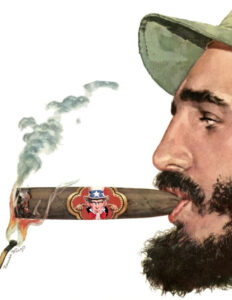
They weren’t extremist- but at the natural centre, the very fulcrum of society. They were going to eradicate poverty and to raise America’s eyes to the stars through the space program. And if they were for a war, it would be a good war. One that would deny the Republicans ammunition against their achieving an end to poverty and racial injustice.
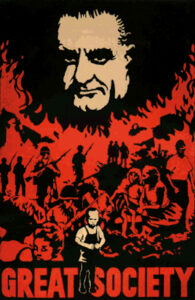
Hubert Humphrey, Johnson’s ‘liberal’ Vice President called Vietnam “our great adventure, and what a wonderful one it is!” The Republican warlords weren’t the only tough guys and weren’t as clever as all that. Despite his earlier misgivings about the Missile Crisis intervention, ‘Mister Secretary’ Rusk had wondered whether it ‘was ‘the time to eliminate the Cuba problem by actually eliminating the island”.[ Transcript of a Meeting at the White House, 16 October 1962.]
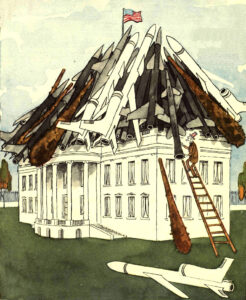
They seriously considered replacing Nevada by Havana as a nuclear test site.
During the missile crisis, Kennedy valued Macmillan’s advice enough to ask him, what he called ‘the 64,000 dollar question’: should he ‘take out’ Cuba?
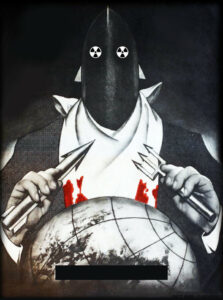
To make it sound good these Masters of the Universe engineered public consent, fabricating “false realities” which then became “news events”.
‘They’re highly educated, these men. They’re clever and they don’t try to hide it. How can they be so corrupt?’
There’s two processes at play here, said Russel, ‘knowledge is power, and power corrupts. So what can message can we conclude from their education?’
‘Study hard and be absolutely rotten.’
‘Of course this brain trust see their emetic policies as all for the greater good and all that. They think they’re on the right road.’
‘The one to hell paved with good intentions.’
‘They half believe the pieties coming out of their mouths. But yet, there is one small problem. Masters of the technical details of every problem, they can’t see the jungle for the trees. Legends in their own minds, walking on water, they come up with ‘brilliant policies that defied common sense’.
‘You can put lipstick on a pig, but it’s still a pig,’ I concluded.
Recasting all those cold war certainties, I came to nut out better how life’s nuances resist easy classification or labelling and how the predominant moral colour of most lives is an uneasy grey.
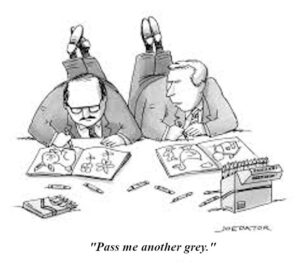
How when some bear false witness and often enough, it will transcend ambiguity and controversy to seem revelatory of absolute truth. All a smokescreen for obscuring their real plans.
Disabused and highly sceptical of bourgeois ideology, I cast away any belief that those who governed knew what was best for people. I thought about it every hour when I heard the business news. Every hour. A hymn to capitalism. The idea that money is what it is all about.
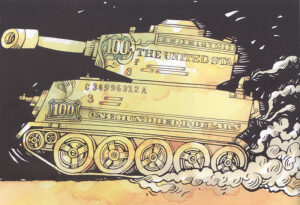
The living close the eyes of the dead.
Now the dead were opening the eyes of the living.
From that moment on I saw through completely new eyes, my thinking revolving around a set of opposing attitudes. On one hand, those of a small clique of big shots and power brokers who try to determine in a few hundred boardrooms of the biggest companies, usually abroad, every aspect of our way of life according to their overwhelming private appetites and profits- where and if we work, what and if we eat, where and if we go to school, the water we drink, the air we breathe, down to deciding whether we, the outsiders, go to war or not.
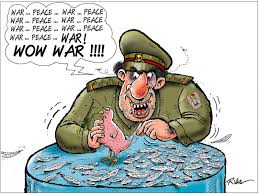
Who practise their golden rule-those with the gold rule. To people like them, the only thing Jesus got for his efforts was being nailed to the cross. They put their money on the Romans every time.
On the other, on the same page as me, along similar lines, those of organized groups who act in various ways towards lifting this siege, ending the pestilential war and doing away with wage slavery. I cast my lot with them, all the way, contending that renting one’s self to an owner isn’t much different to slavery in which the worker is individually owned. I came to hold that workers should own and control their own workplace and lives.
‘War is the result of competition for markets. Workers have no stake in war’ said Russel. ‘It involves workers dying to expand the profits of their masters.
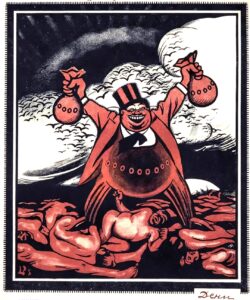
It weakens their movement that is supposed to transcend national boundaries. Workers know no nation. Their common interests tend to be stronger than any national identity they have with their bosses.’
I expressed my encouragement to Dr Evatt’s successor, Arthur Calwell, who shared these of Russel’s sentiments, to sedulously oppose Menzies’ support, and extended to him my best wishes.
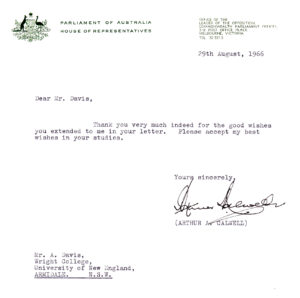
Arthur’s anti-war activities went back to World War I when he was a rock ribbed anti-conscriptionist. As a youth he had supported the struggle for Irish independence. His response to the announcement by Menzies of Australia’s armed backing for the US was a speech in Parliament which is great for its simplicity and power to move.
Wrapped around the words of Graham Freudenberg, the speech said, in small part: “It is not our desire, when servicemen are about to be sent to distant battlefields, and when war – cruel, costly and interminable – stares us in the face, that the nation should be divided. But it is the Government which has brought this tragic situation about, and we will not shirk our responsibilities in stating the views we think serve Australia best. Therefore, I say, we oppose this decision firmly and completely. We do not think it is a wise decision. We do not think it is a timely decision. We do not think it will help the fight against communism. We do not believe it will promote the welfare of the people of Vietnam. On the contrary, we believe it will prolong and deepen the suffering of that unhappy people.
“And I address this message to my colleagues here in Parliament and vast band of Labor men and women outside: the course we have agreed to take today is fraught with difficulty. I cannot promise you that easy popularity can be bought in times like these. Nor are we looking for it. When the drums beat and the trumpets sound, the voice of reason and right can be heard in the land only with difficulty. But if we are to have the courage of our convictions, then we must do our best to make that voice heard”.
“I offer you the probability that you will be traduced, that your motives will be misrepresented, that your patriotism will be impugned, that your courage will be called into question. But I also offer you the sure and certain knowledge that we will be vindicated, that generations to come will record with gratitude that when a reckless Government wilfully endangered the security of this nation, the voice of the Labour Party was heard, strong and clear…”[ Parliament May4,1965]
He went on to stress that Labor views on Vietnam were ‘supported by opinions expressed by the late President J. F. Kennedy, and by other distinguished Americans like his two famous brothers, Senators Robert and Edward Kennedy, and by Senator Fulbright.’
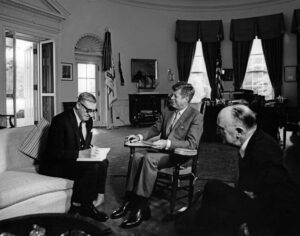
Sadly, in the gadarene rush to the colours, the drums of war beat louder drowning out this voice, segregating good men obediently from public risk.
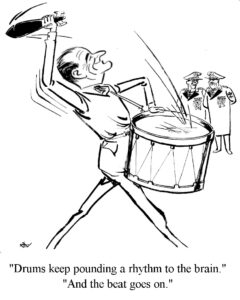
The new coalition Prime Minister Harold Holt was going all the way with LBJ, the war was still popular and the number of bodies bagged and tagged was only just starting to climb. There but for the grace of God went I.
Arthur Calwell conducted a vigorous campaign against conscription for this war.
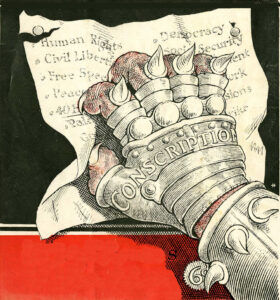
Whether as a measure of conscience or plain fear, many young people were being drawn to it. It was during this campaign that Arthur was the victim of an assassination attempt after an an anti-conscription rally at Mosman Town Hall.
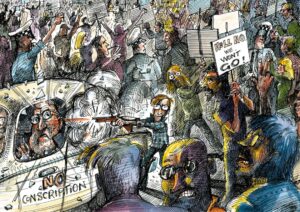
He was the first Australian to be such a victim.
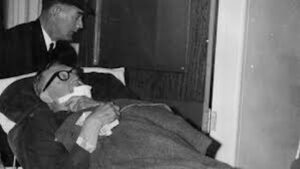
One of the three people who pursued and restrained the man who tried to kill him was Bob Gould. In his self-declared ‘Forrest Gump’ persona, ‘Bookshop’ Bob was immortalised in the caption of a photograph in Russel’s book, Australia Since the Coming of Man, as the bloke who captured Kocan.
Arthur was not only physically attacked but media waged a campaign to destroy him. The hostile headlines were a distraction which diverted attention from his political agenda.
I took a tumble to why armies of the world prefer to conscript 18 – 20 year olds for military service. Cherry picking such low lying fruit, at their peak of fitness, adventurous with few commitments and subservient to a higher authority. They’re only young forever once. They think they are upholding an ideal, whether or not their leaders at home, trading on their patriotic feelings, really believe in it. They’re certainly not fighting for the credibility of those leaders.
These young men too are victims of war, trapped by the same structure as those who refuse to kill other mothers’ sons for whatever reason. Especially those who had dropped out of school. They didn’t have the escape routes that the elite, the wealthy and those born to the purple had. Unable or unwilling to work their ticket home they had the least to gain by taking part. There was nothing for them to look forward to. They looked upon military service like the weather. They just had to go in and do it.
‘It’s no coincidence those pushing for war, appealing to the worst instincts of humanity, are those who say they are pro-life and opposed to family planning,’ said Russel. ‘Once you leave the womb, militarists don’t care about you until you reach military age. Then you’re just what they’re looking for. Militarists want live babies so they can raise them to be dead soldiers.’
‘They’re pro- life for the unborn. Pro- death for the born.’
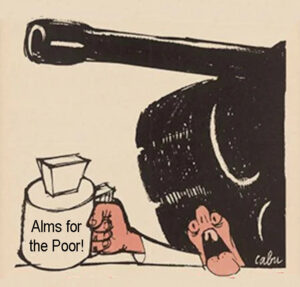
At a stage of their development where they are impressionable, malleable, the minds of many young men can be moulded, them lacking the life skills necessary for manhood. It is these qualities with them I shared-if not the bravery – that make the ideal soldier.
But there’s something more, something even more important. Their moral conscience hasn’t been fully developed. They can have difficulty distinguishing between right or wrong with regard to taking life and a lawful order. The fact that they can readily die for a cause does not make that cause right.’
‘Theirs’ is not to reason why. Theirs’ is but to do and die.
‘Exactly. Yet “the moral cause” is chief among the principles of warfare. The side with the stronger moral cause – self-defence against a foreign invader – despite being outnumbered, outgunned, and outspent, can prevail, if not without enormous costs.
‘Exactly. Yet “the moral cause” is chief among the principles of warfare. The side with the stronger moral cause – self-defence against a foreign invader – despite being outnumbered, outgunned, and outspent, can prevail, if not without enormous costs. The most important thing military personnel can take into combat is a reason why.
‘War is a monstrously wasteful way of achieving a social objective, always involving indiscriminate mass slaughter unconnected with that objective’, said Russel. ‘It doesn’t solve any fundamental problems. This feudal way of thinking always kills and poisons the bodies, minds and souls of everybody on both sides.
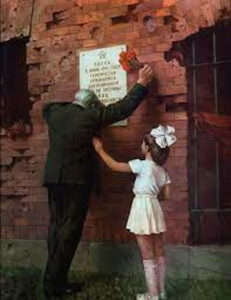
Even World War II, with its stark moral issues-the ‘best’ of all wars-presented agonizing moral questions. Any situation where right and wrong are not so clear, and where human life is being sacrificed, has to be regarded with deep suspicion.
To avoid any such moral dilemmas, the soldier inevitably has to dehumanise the enemy.
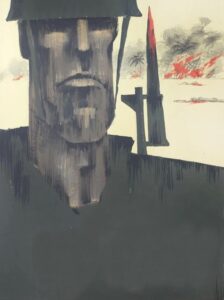
In the aftermath of the 21st Century NATO defeat in Afghanistan Prince Harry would acknowledge as such about those he had shot in battle: “When I found myself plunged in the heat and confusion of combat I didn’t think of those 25 as people. They were chess pieces removed from the board.’
The whole military culture goes against this doubting’, Russel continued, ‘Can you imagine the military calling on soldiers to examine their own conscious thoughts and feelings?
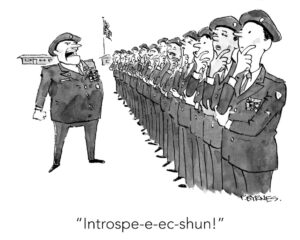
‘Of course not. ‘It’s a programmed entity, more concerned about actions and consequences than right and wrong. It doesn’t want soldiers thinking as individuals.
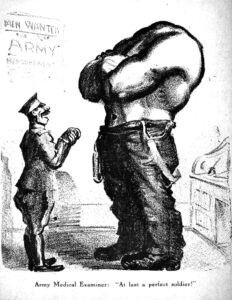
It doesn’t want them thinking in shades of grey.

Grey relates to emotions and the army doesn’t want emotional soldiers. It fears such men can lose their cohesion and sense of purpose.’
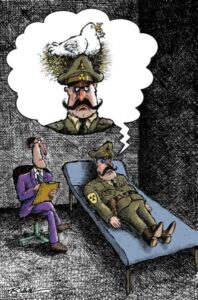
‘That’s just what happened in ‘The Long and the Short and the Tall’, isn’t it. Look at the moral conflict that arises when the Japanese scout is taken prisoner.
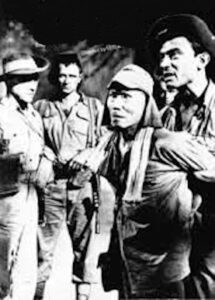
Whereas some members of the patrol see a dangerous enemy -because he is wearing a different uniform- others see only another human being. As they ruminate on the fate of their prisoner, the British soldiers’ moral undulations resemble a pendulum swinging between civilised behaviour and barbarity.
Given hazy, vague instructions about what they may and may not do. they could have been reprimanded on the one hand for hampering their unit with prisoners or hauled up as murderers for obeying orders. The outcome was all too predictable.’
‘And perpetrated by men who don’t have an intrinsically barbarous nature.’
‘On the contrary. The fact of the matter is that war changes men’s natures. The barbarities of war are seldom committed by abnormal men. The tragedy of war is that these horrors are committed by normal men in abnormal situations. Situations in which the ebb and flow of everyday life have departed and have been replaced by a constant round of fear and anger, blood and death. They can be submitted to extraordinary provocations and pressures.’

‘There’s little to justify war as an answer to resolving differences between countries, wouldn’t you agree?
‘This drama reminds us that the objectives of war and the interests of humanity are mutually incompatible. It prompts us to reflect on whether there can ever be a moral basis to any war. Although they would deny this, the armed forces, and the army particularly, want automatons solely to answer to them. If they didn’t, most would question orders and the structure of the system. They would be more likely to see it as an outmoded way of settling national differences. What if the militarists put on a war against another country and nobody came?
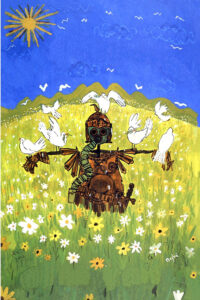
‘It’s like a cult, isn’t it. These forces aim to break you down, down to nothing, a no one who forgets about everything outside. Then they build you up again the way they want.’
‘Like Frankenstein’s monster. Then they send you off to war to do anything they want you to do.
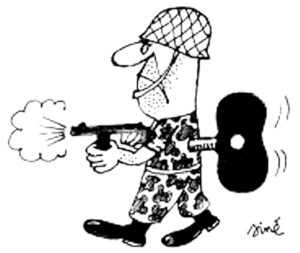
And for what? Do you think if a man thought twice, he’d give his life at the drop of a slouch hat for his queen and country. That’ll be the day.’
‘Surely in these greater democratic times, there is more capacity for the ranks to have their say?’
‘The lines of communication between diggers, NCOs and officers are as rigid as ever. The correct procedures and official channels must always be adhered to. When standing fast individual troops must remain at the attention.
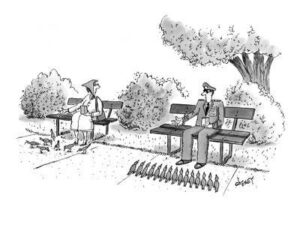 All movements must be carefully choreographed.
All movements must be carefully choreographed.
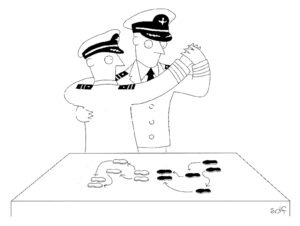
The officer class is alive and well today as it was in feudal times. It sees insubordination and mutiny around every corner. Hence the constant pressure and tests to weed out the cream puffs, the non-conformists and troublemakers.
Square pegs in round holes’, I said.
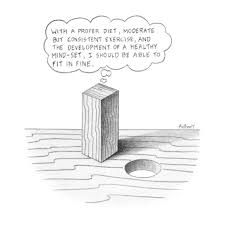
Those who can’t really belong, don’t want to, or refuse to.’
‘Those in this awkward squad are dealt with swiftly. ’

They are forced to fit into positions they’re unsuited for and made to stick when the system re-shapes their edges. Do you know why we dress soldiers the same? So everybody knows they are replaceable.’
I thought the method used to dragoon young men into military service was very unjust. A ballot was introduced where balls with birth dates were selected at random from a barrel. A most unlucky dip. I felt no one should be forced to serve because if the war was considered vital to Australia’s defence, most would come forward. It became clearer why they wouldn’t.
‘The U.S. is fighting what amounts to a colonial war with a conscript army’, said Russel. ‘And a colonial war is a very dirty kind of war. You’re not fighting armed forces. You’re fighting mostly unarmed people. And to fight that kind of war requires professional killers, which means mercenaries. The Korean mercenaries in Vietnam are professional killers. As we speak they’re just massacring people outright. And the home of the brave does plenty of that too, but it won’t be able to take it after awhile. It’s not the kind of job you can give to conscripts, who are not trained to be murderers. The U.S. army, like ours is a citizen’s army, not divorced from what’s happening in society in general.’
I’d be hanged if I’d become cannon fodder, sacrificing my life for Menzies’ party, for reasons of state. Like chicken hawk John Bolton who would eternally lust after war with Iran I had ‘no desire to die in a Southeast Asian rice paddy’. Not for anything. When members of Menzies’ peer group were clamouring to join the colours at the beginning of World War 1,, he weaselled out of enlisting in the AIF although he held the rank of lieutenant in the university regiment. He sat out the war, accused by many of being a chickenhawk.
‘Whether you are conscripted or whether you resist, be prepared for a rocky ride’, said Russel. ‘You will be affected, one way or the other. If you go, you will be expected to kill or be killed. If you stay, you may be instantaneously and widely decreed to be a cowardly terrorist sympathizer, a defeatist traitorous funk giving aid and comfort to the enemy and someone to be white feathered. You’ll be smeared as a paid puppet of Hanoi or Peking or Moscow.’
‘You’ll be called a traitor, I guess.’
‘That’s a wrongheaded notion of what treason is and what patriotism is. If you define patriotism as obedience to the government, then you are, I think, following a kind of totalitarian principle, because the principle of a totalitarian state is that you do what the government tells you to do. There’s some notion that if you disobey the orders of your government or the laws of your government, you’re being treasonous. But I believe the government is being treasonous and the government is being unpatriotic when the government violates the fundamental rights of human beings, when the government invades another country, a country that has not attacked it, a country that has not threatened it.’
There’s nothing new about it, is there.’
‘It’s the oldest trick in the book for governments to smear legitimate critics of their policies as foreign stooges. That’s insulting because it takes our agency away from us, as if we can’t think on our own. You’ll be seen as someone who will get what’s coming to you. You’ll be labelled unpatriotic by nationalists.’
‘‘Our patriotism is different to theirs. Like the man enchanted by a woman’s beauty, we love our country with open eyes yet can’t be blind to it’s faults.’
‘One thing’s for sure. Once you know how to think, you won’t ever again have the comfort of sitting on the fence, arms folded, above the fray whilst others suffer. You can’t be a neutral, objective witness to war. It’s not enough to just refuse and absolve yourself from this systematic violence. It’s crucial also to struggle against it actively, because you can only refuse once. Even if you’re unaligned, you’ll be maligned. Non action is an act and silence speaks very loudly. To sin by silence, when we should protest makes cowards out of men.’
‘Some say too much protest leads to chaos and confusion.’
‘The human race has climbed on protest. Had no voice been raised against injustice and ignorance, the Inquisition yet would serve the law And the hangman decide our least disputes.’
‘Silence isn’t always golden’.
‘Real freedom is much more than the freedom to indulge in wilful ignorance and look the other way.’
‘Or as John and Paul sing, ‘Living is easy with eyes closed, misunderstanding all you see.’
I don’t want to become the Australian equivalent of ‘the Good German,’ a citizen who passively condones the evil actions of his government. I need to pay back my good fortune in not being called up. We’re all individually responsible for war. Yet it’s understandable. People don’t want to get involved in anything they prefer to feel doesn’t concern them They don’t look too closely at something they prefer not to relate to.’
‘Even a blind eye can be poked out.’
‘You have to make a determination about what it is that’s important to you. If you want to be in touch with your humanity, you have to be outraged by injustice because the alternative is indifference. Not to speak is to speak. Not to act is to act. If we don’t talk openly about these crimes, we are not only hostages to the lie but to its promoters. If living—living unfreely but comfortably is something you’re willing to accept—and I think many of us are; it’s human nature—you can get up every day, you can go to work, you can collect your paycheck or allowance for relatively little work against the public interest and hit the sack at night after some entertainment. But if you realize that that’s the world that you helped create and it’s going to get worse with the next generation and the next generation who’ll extend the capabilities of this sort of architecture of oppression, you realize that you might be willing to accept any risk, and it doesn’t matter what the outcome is, so long as the public gets to make their own decisions about how that’s applied.’
‘The media don’t help them much, do they?’
‘The media owners don’t see it as in their interests to tell the truth. It’s too dangerous for them. If you want the truth in this country you have to seek it out. You must be vigilant, uncompromising, relentless.’
‘And then what?’
‘Once you have a mind of your own, you can’t put your head in the sand about it. Those who stand for nothing fall for anything. You have to stand for something. If you don’t, you will find yourself caught in no man’s land, perplexed as to why the men on both sides of the divide have their guns trained on you. War’s what drives history along. It has a way of distinguishing between those things that matter and those that don’t.’’
Hounded,Hunted and Haunted.
‘War will exist until that distant day when the conscientious objector enjoys the same reputation and prestige that the warrior does today.’
John F. Kennedy
“War cannot be humanized. It can only be abolished.”
Einstein
Not particularly fancying the idea of bending over with somebody looking up my rectum, not wanting to do time, I thought about voting with my feet. I had toyed with all kinds of escape routes offering deliverance from The Masters Of Disasters wanting to press-gang the likes of me into national ‘service’. ‘Here Goes Nothing’, I thought, guided by my moral compass and my training. I saw myself off the grid, taking a page from Massai’s book, going to ground, flitting away, traipsing through the wilderness in full flight, the air crowded with flies, mosquitos, smoke and mist. Seldom catching my breath, covering my tracks, cold camping so that no smoke would give me away, wading the length of creeks to throw the posse off the scent, to shake them off gaining on and heading me off at the pass. Scaling gorges, on all fours, bellying up ridges, staring over precipices, clambering down cliff faces, skin scratched and bruised by jutting thorny branches, skulking behind boulders, making myself scarce under bushes, one eye always open, stalked relentlessly.
They sought me here, they sought me there, they sought me everywhere.
I went through all sorts of narrow places, climbing up dwellings, running off roofs and hiding in empty huts. Lying low, trying not to give myself away, I waited for the air to clear, Gliding like a ghost from farm to farm, I slunk past isolated farmsteads, hunkering down in their sheds, crawling through culverts, sneaking to the edges of small towns for rations, shunning the suspicious gaze of locals, fearful of the patriotic wrath of their reception committee, keeping an eye on my back in this game of cat and mouse. Whew! How long could I hold out before the posse closed and I’d be stretched out, hands by my side, palms up and cuffed. The breadcrumbs wouldn’t have been that hard to follow. It didn’t take this ‘fugitive’ draft dodger long to arrive at the only conclusion. Nowhere to run to nowhere to hide.
To my relief my number didn’t come up in this devilish “lottery of death”.
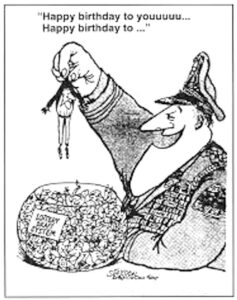
I couldn’t afford to live openly under an assumed name behind a beard in Stockholm or Paris or in Montreal .
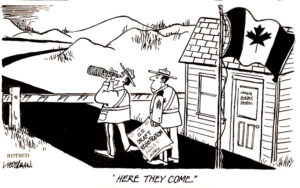
At the same time I was a beneficiary of the unfairness. My response was far from the dramatic, certain and courageous individual resistance to the war that some conscientious objectors took. Everyman for himself, Lady Luck made the draw and the devils took the hindmost. Lambs to the slaughter. Such easy game.
Following a constant heavy conservative media barrage to soften up public opinion, the Labor Party was mauled at the elections in November 1966 after which Arthur would lose his party’s leadership to Gough Whitlam with his powers of magnetism.
The leadership tussle was fought over the question of maintaining principles versus the taking of office.Purity versus pragmatism.
Before casting my vote, I was handed an election pamphlet containing a map of the Asia-Pacific region. Large red arrows pointed down from China to Australia, asking the question ‘Where do you draw the line?’ It declared ‘We won’t go down on on our knees to the Pekingnese.’
Another put out by the Liberal party before being withdrawn showed a big bronzed aussie pulling a rickshaw in the seat of which sat an Asian soldier, his arm around a towheaded woman. Supporters of Tom Uren’s Liberal opponent tried unsuccessfully to get him running scared. They placed stickers over his election signs depicting a big red rat with a hammer and sickle on it’s rump.
‘It’s pretty crude, isn’t it? I commented to Russel in his flat, showing him one of these pamphlets. ‘Someone had threatened that Tom would be running as a ‘gelding’.’
‘People can always be manipulated into holding with and fighting forever wars for their political leaders,’ he said, reaching for a book on his shelf by Gustave Gilbert. He quoted some lines:
“Of course the people don’t want war . . . But after all, it is the leaders of the country who determine policy and it is always a simple matter to drag the people along whether it is a democracy or a fascist dictatorship or a parliament, or a communist dictatorship. Voice or no voice, the people can always to brought to the bidding of the leaders. That is easy.
All you have to do is tell them they are being attacked, and denounce the pacifists for lack of patriotism, and exposing the country to greater danger. You blame them for their betrayal.
‘And of course you tend to blame those who are closest at hand.’
‘And unarmed. The Nazis blamed the clergy, socialists and Jewish capitalists for losing the first world war.
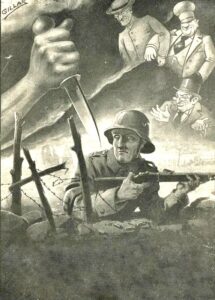
”It works the same in any country.”
‘Mr. Gilbert certainly knows how things work,’ I said. ‘What led him to this conclusion?’
‘These are not the words of Gilbert himself. They are those of Field Marshal Herman Goering, Hitler’s second in command and head of the Luftwaffe. Gilbert, his prison psychologist, who was given free reign to talk to all prisoners during the Nurenberg Trial, kept a journal of his observations. Goering’s words on sowing discord and fear should be discussed compulsorily at school.’
‘I can’t agree more. But why can’t we learn such things at school in the first place?’ ‘There are two kinds of history, Allan. There’s the official history, the one taught in schools. This blinkered nationalist interpretation leaves people vulnerable to those who teach them to hate people they’ve never met, and to take pride in accomplishments they had no part in. And then there’s the secret history. A scandalous history which explains how things really happened.’
Like any serious opponents of the war against Vietnam, my only response could be to double-down the withdrawal of the primary aggressors from that country.
Demonstration Against Johnson.
It is curious that physical courage should be so common in the world, and moral courage so rare.
Mark Twain
We have met the enemy, and he is us.
Walt Kelly
I trained it to Sydney in October 1966 to protest against the visit of President Johnson. I went down to the demonstration to get my fair shares of abuse. Although it wasn’t as colourful as in Melbourne- his car there was splashed with paint- it was equally dramatic.
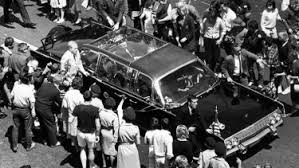
Nailing their colours to my mast, I joined 10,000 demonstrators at Hyde Park corner waiting for his motorcade to come into the city from the airport. The footpaths were packed solid, the windows crowded, traffic piled up for blocks around. Men with cameras popped up on balcony rooftops. By 9am, there were about six or seven thousand people, by far the biggest demonstration in Australia against the war up to that point.
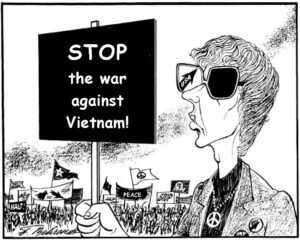
Sharing this spot with our troops were some strange bedfellows who had been allocated the same corner for the official welcome. At the back were a couple of hundred right-wing Croatians, come to hail their conquering hero. I heard one of them say, ‘These red rats have no respect for such a brave man. The President not long ago underwent an agonising gall bladder operation.’
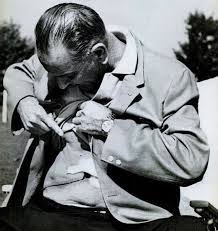
In the middle of those assembled was a solid bloc of about 300 or 400 Mormons, armed with their Tabernacle Choir. When the choir started up, they had an enormous organ which drowned out our chants. They were belting out “The Yellow Rose of Texas” and “Deep in the Heart of Texas” and we were screaming out ‘U. S. Out Of Vietnam Now!’, rubbing it in: ’Hey, Hey LBJ, How Many Kids Did You Kill Today. What do we want? Peace. When do we want it? Now!’
‘However, they had the advantage of a powerful amplification system rigged up in the park — we only had thousands of unassisted lungs. Nevertheless, some bright spark managed to dig up a pair of pliers and cut their power. Despite their frantic attempts to repair it, they were eventually sent off the air. Fortunately, we were on top at the crucial time when Johnson came into view. The cri de coeur came out, ‘Block the war machine by whatever means are available”’
The crowd just erupted and poured onto the road. The barrier had consisted simply of a single wooden plank hooked between stanchions, kid’s stuff compared to today’s defences. Then some of the more daring laid down to block the cars.
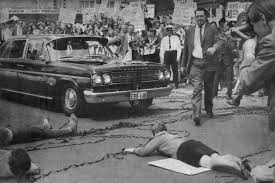
This is apparently when Liberal Premier Askin uttered his infamous words `Ride over the bastards.”
One organiser was up a big fig tree all the time, speaking to the crowd on a megaphone, trying to direct the human traffic against this imperialist leviathan. People were heading everywhere; it evolved way beyond anyone’s direction.
After this scary confrontation with the motorcade, I found myself with most hotfooting it through the park to the Art Gallery. Johnson had been sped there at warp speed arriving earlier than some other dignitaries.
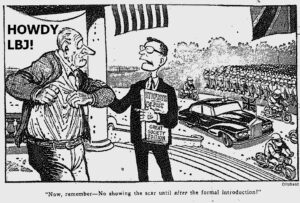
His motorcade had moved so fast that the little kids who’d been dragooned out of school to line the streets didn’t realise he’d gone past. But the editorials the next day railed at the heartless demonstrators who forced the President to speed through the city, spoiling the day for the poor school children who had come to see the President.
A Matter of Opinion.
“Those who make peaceful revolution impossible will make violent revolution inevitable.”
President John Kennedy.
Young people go through lots of changes and I had gone through mine at an astronomical rate. I had spoken too soon before and now, switching gears, I was determined not to speak too late.
With all the zeal of a recent convert, I fired off a letter to the Namoi Valley Independent (3/11/66) my home town local newspaper alerting readers as to what I saw as the simplistic, two-dimensional and one-sided view of its editorial line towards the war. Westmoreland had not quite yet replied to my letter which I had sent several months before, like most of my letters, by slow moving affordable yet reliable surface mail. Johnson had just visited his ‘Texas of the South Pacific’, the 51st state, prompting swooning and surging to press the presidential palm.
Just the previous month Johnson had met with other Asian and Pacific leaders at the Manila Conference to review progress in the escalating conflict in Vietnam.
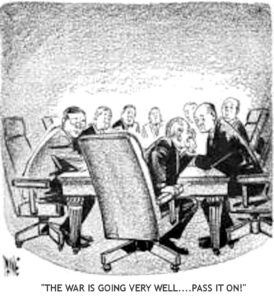
I was much less optimistic.

I respect the editor, John Longmuir, for having carried my polemic.
I urged readers to look at the situation from the perspective of those we were fighting. Having boned up on the bigger picture I saw a holdover of the imperialist tradition of richer, more powerful states imposing their way by fair means or foul on weaker ones. On the debit side of the historical ledger, the U. S. was, in the long game it was playing, aping the earlier anti-Comintern pact of the Axis powers. In this case the aim was not for settlement but for a show of strength between the superpowers. While the American government portrayed the Vietnam War
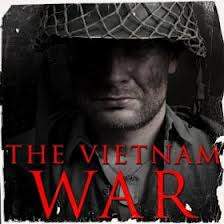
as one front in a global conflict with a unified Communist enemy, for the Vietnamese themselves it was a war of national liberation in which they fought to throw off control by the imperialist states. The Communists were but one element in the Viet Cong leadership. I likened the struggle of the Vietnamese to that of the North American Indians. I saw the same racial stereotyping in play whereby the enemy was seen as inferior and uncivilized.
What I saw as particularly reprehensible was the return to South East Asia of the ‘colons’ wanting back their rule after having had their forces overrun, after abandoning control to the Japanese forces. Their aura of invincibility destroyed, the re-imposition of rule by them or the Americans, after they had presented the war as a struggle for freedom and equality against Axis tyranny and injustice, would fuel national resistance. As an up and coming military officer in the Dutch East Indies Nasution had to experience the feeling of powerlessness that accompanied the approach of the Japanese imperial forces toward the Dutch East Indies. The Dutch fled leaving behind a poorly trained ill-equipped defence force which fell apace. They would never regain their rule again. In Indochina it was much of a muchness. The French return would culminate in their eventual drubbing at the Battle of Dien Bien Phu.
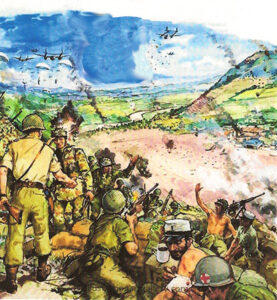
Praise God and Pass the Ammunition.
He blesses the boys as they stand in line
The smell of gun grease and their bayonets they shine
He’s there to help them all that he can
To make them feel wanted
he’s a good holy man
He smiles at the young soldiers
Tells them its all right
He knows of their fear in the forthcoming fight
Soon there’ll be blood and many will die
Mothers and fathers back home they will cry.
He mumbles a prayer and it ends with a smile
The order is given
They move down the line
But he’ll stay behind and he’ll meditate
But it won’t stop the bleeding or ease the hate
As the young men move out into the battle zone
He feels good, with God you’re never alone
He feels so tired and he lays on his bed
Hopes the men will find courage in the words that he said
You’re soldiers of God, you must understand
The fate of your country is in your young hands
May God give you strength
Do your job real well
If it all was worth it
Only time it will tell
In the morning they return
With tears in their eyes
The stench of death drifts up to the skies
A young soldier so ill looks at the sky pilot
Remembers the words:
“Thou shalt not kill”
Eric Burdon & The Animals,
The American attempt to fill the vacuum would be equally ill-fated. In my letter to the newspaper, rejecting the cannons of the Church, I took Cardinal Spellman, the top ‘sky pilot’ in military slang, to task for his portrayal of the resistance as “godless goons”. This political operator cast in the Medici mould had declared the conflict to be “Christ’s War”, an appalling allusion to the crusades.
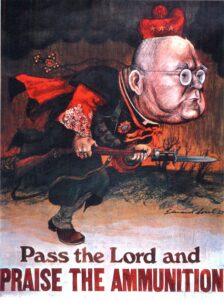
He said to one lay antiwar protestor, ‘I would cite you to the Apostle Paul and his clear and wise command in Romans 13 to obey the laws of the government because God has ordained the government for his purposes.’
There’s never been a kingdom so given to bloodshed as that of Christ. As in the case of Cuba, and later Iraq, the elements of containment had come wrapped in the rhetoric of a holy war.
Lyndon Johnson requested the pro-McCarthy Spellman send priests to the Dominican Republic to keep the country, recently invaded by the U.S. because of a localized Communist threat, in the ‘free world’ camp. This sanctioned, in all senses of the word, violating the separation of church and state. Spellman may not have been a bigot but he was a harrowing hawk.
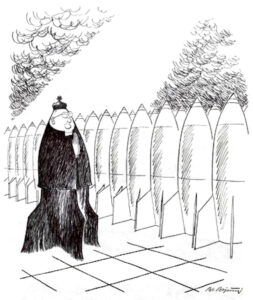
When invading Iraq Bush would follow his messianic, insane vision that he had a mandate from God. After his forces went in, Bush said that prayer could bring us comfort. ‘So could heroin’, one might have added, ‘but that didn’t make it right.’
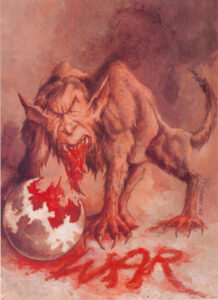
With God on Our Side.
Ye Hypocrites, are these your pranks
To murder men and gie God thanks
Desist for shame, proceed no further
God won’t accept your thanks for murder.
Robert Burns
Historians generally date the beginning of the Vietnam War from the action of President Kennedy, the sending of 25,000 military “observers” to Vietnam. From that point the Vietnam headache seemed to grow like a cancer. The prevailing wisdom in Washington at that time was that Kennedy was paying off Cardinal Spellman. Spellman had worked hard during Kennedy’s election campaign to round up Catholic votes in New York State, and New York had gone to Kennedy in the election. Without New York, Kennedy would not have been elected, so Spellman had some big political IOU’s to call in.
Rumour had it in government circles that Kennedy thought sending an American military presence to Vietnam was unwise, but that politically he felt he could not say “No” to Spellman. I wasn’t aware of this grievous error at the time of my writing to the paper.
The resistance in Vietnam included Buddhists, the majority of the country. They were opposed in particular to the corrupt Ngo Dinh Diem ruling family that Spellman, the favoured Catholic clergyman consulted by the White House on policy matters, was instrumental in installing.
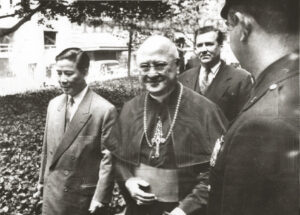
He failed to see the historical irony in which he and his followers constantly harked back to the indignities suffered by Catholic Ireland at the hands of a minority faithful.
Indonesian non-alignment likewise didn’t sit well with Washington. US support for the corporate takeover by Soeharto involved supplying them with names of suspected Communists and it would lead to the unleashing of extreme Islamists upon secular and liberal-minded people.
The size of this was beyond me.
‘The New York Times reports the Johnson administration’s “delight with the news from Indonesia.”, Russel informed me. ‘It also reports a cable by Dean Rusk supporting the “campaign against the communists” and assuring the leader of the coup, General Suharto, that the “U. S. government [is] generally sympathetic with, and admiring of, what the army is doing.”
‘What is the attraction that Southeast Asia has exerted for centuries on the great powers? Why is it sought after, and why is it important? What are their reasons for interfering?’ I asked Russel.
‘There are lots of reasons’, he replied. ‘Uniroyal, Union Carbide, Eastern Airlines, Singer Sewing Machines, National Cash Register, the Freeport McMorRan gold and copper mining company and the insatiable Richfield and Mobil oil companies.
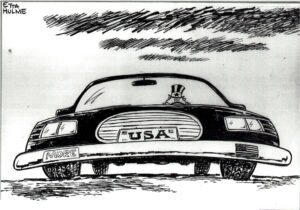
They all have investments there. They all want to expand their markets.’
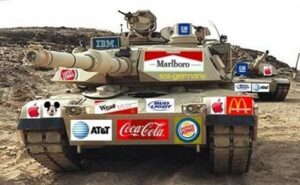
‘So it’s all about costs and prices rather than any higher calling.’
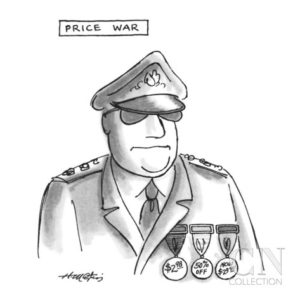
‘There’s no way like the American Way.
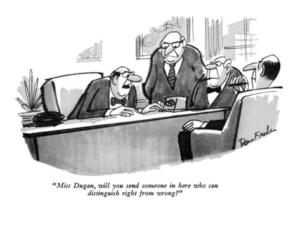
‘So it’s all about business and the fight for resources.’
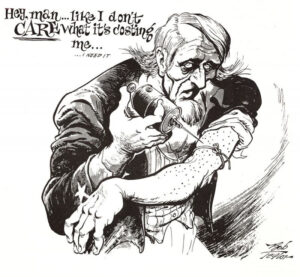
‘That’s what the world turns on, Allan. It always has. ‘
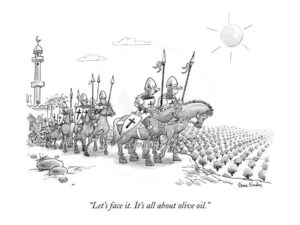
And on the fight for oil in particular.’

‘Any region that contains oil reserves or is geographically positioned in a location where an entity has or may wish to develop production or transportation infrastructure for petroleum products is more likely to attract aggressors than those which don’t.’
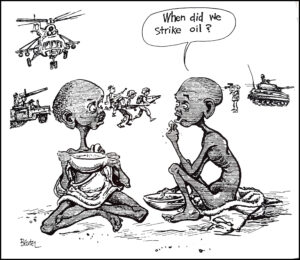
‘So who’s doing most of the turning today?’
‘It’s the military-industrial complex that President Eisenhower warned about. And one can add the financial sector to that.’
‘So to give it its full title, it’s the military-industrial-monetary complex.
‘Precisely. And with regard to going to war, all three sectors get together when necessary.’
‘So when all three agree to stake their claim on the global materials they want access to, it’s extremely difficult to stop them.’
‘Many in Washington see Indonesia with its rich hoard of natural resources as the South East Asian region’s centrepiece.’
‘So what do they have their eyes on in these islands?’
‘They’re only interested in two things. The waters around them and the resources that lie within them.’
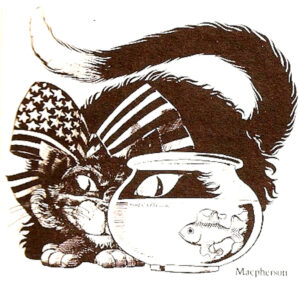
‘So it depends on whether they are thirsty or hungry and for what . And their interest in the region generally?’
‘Southeast Asia provides a lush climate, fertile soil, rich natural resources, a relatively sparse population in most areas, and room to expand. It is the principal world source of natural rubber, coal,iron ore and tin, and a producer of petroleum and other strategically important commodities. Japan depends on the rice of Southeast Asia, and the U.S. fears Communist victory there would “make it extremely difficult to prevent Japan’s eventual accommodation to Communism. ’
‘This is not the language that is used by our politicians in their explanations to the public. They talk of Communism versus freedom.’
‘Of course,’ he said. ‘What would you expect’.
‘Apologists for American foreign policy say that it only gets dragged into wars started by others. That’s why it entered the last two world wars well after they had started.’
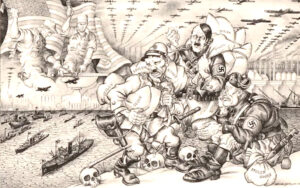
‘One could say they’re trying to make up for the fact they were late for these. They’re going to be really punctual next time.’
‘So how does the United States, a nation based on the democratic principle, manage to rule most of the world?’
‘Badly, Allan. Badly. It’s always worrying about where to intervene next.
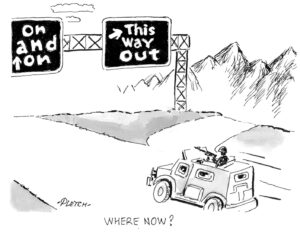
Any short gains it makes by dominating markets are usually outweighed by long term resentment and anger at the anti-democratic methods employed. As Pericles pointed out an empire tends to become greatly overextended. It becomes difficult to leave off its dominion over others.’
Hitler boasted that the German Reich would last one thousand years. Churchill speculated about the British Empire lasting as long. ‘Do you think that America’s will endure or fall like these or that of Rome?’
‘Like Peter Ustinov I will answer that the concept that things are going to fall is always there.’
From the Halls of Montezuma.
‘The things you know, Russel! How do you get to see the large picture? Where do you get all your information?’
Mainly from U.S. governmental agencies such as congressional study missions which are not hesitant to state their fears. It’s there for anyone who takes the time to read between the lies.’
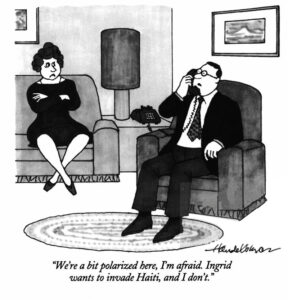
I came to the inevitable conclusion. As elsewhere around the world, the US could then and still does fix on using direct military intervention or use its local allies to destabilize governments perceived as threats to such strategic interests.
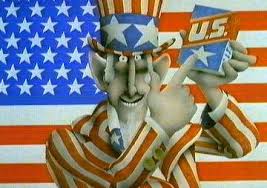
Captain America could then and still does look on the horrors of dictatorships with equanimity so long as no hand is laid on US corporate capital.

Was this just a series of isolated freak mistakes or monstrous aberrations?
As Teddy Roosevelt used to say, ‘horsefeathers’.
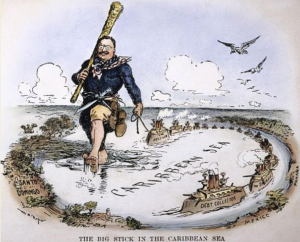
The US would end up in this position, time after time, of fighting against the self-determination or the nationalism of other countries, and taking on those murderous tasks as opposed to dealing with problems at home. To answer why this is so we have to consider the history of this Land of Opportunity.
The US was founded on two horrible crimes, unbelievable crimes: one, virtual extermination of the indigenous population and a form of slavery, which was the most vicious in history.
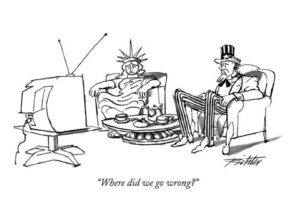 It is in fact the basis for a large part of the wealth and economic development of the United States, England, France and others.
It is in fact the basis for a large part of the wealth and economic development of the United States, England, France and others.
The rhythms of exuberance had guided the land of the free, home of the brave as she claimed the twentieth century as her own.
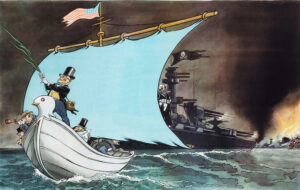
It was all part of a chessboard design. For these repeat offenders with a long rap sheet, bombing people and whacking some local nuisance abroad is as American as apple pie. When you look very carefully at what it is that causes this constant oppression, you will see that somewhere in there, America plays the game.
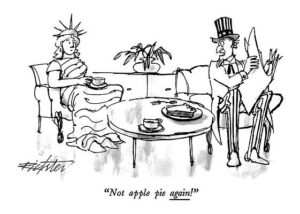
They’ve long been the world’s biggest arms suppliers.

Round and round it goes; where it stops nobody knows.
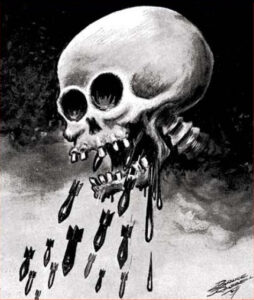
From the Halls of Montezuma to the shores of Tripoli, from the first rays of dawn to twilight’s last gleaming, Old Glory’s unfurled for all to see.

With brute force and ignorance they fight in every clime and place where they can take a gun. In the snow of far-off northern lands, under tropical jungle sun.
President Trump would put it this way: ‘You know, we’re in many countries, many, many countries. I–I’m embarrassed to tell you how many. I know the exact number, but I’m embarrassed to say it because it’s so foolish.’
For a US Commander-in Chief to tell the truth about his military over reach is like the proverbial dog walking on its hind legs. It is not done well, but you are surprised to find it done at all.
The sad truth is the U.S. always need enemies.
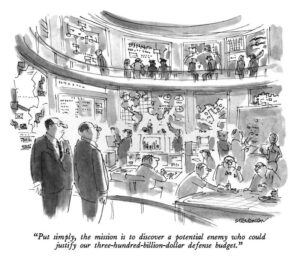
They come and go.
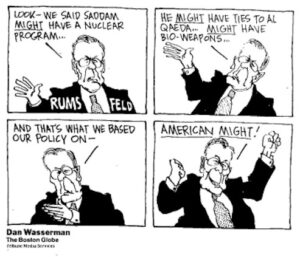
And the Masters and Commanders see their enemies as less clear and smaller than what they actually are.
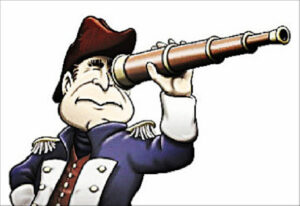
It’s all part of an ongoing policy of red white and blue intervention to install native regimes that act as surrogates for American power and to set up the plumbing and wiring of their vassals’ internal affairs. Full-spectrum dominance.
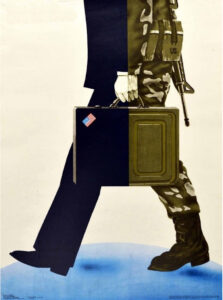
Empire does not always imply direct rule. Imperial powers have extensive spheres of influence, in which their overwhelming power enables them to coerce or persuade countries to align their policies with the hegemon’s interests.
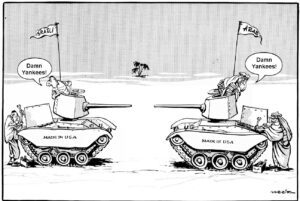
In 1956 they withdrew aid for Yugoslavia, unhappy with it’s current rapprochement with the Soviet Union.
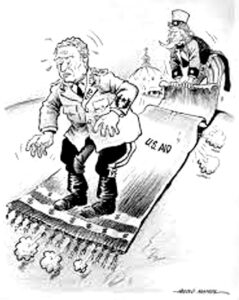
Aid comes with strings attached.
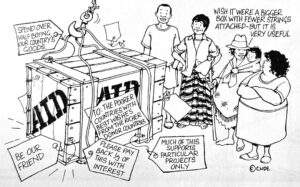
What is the procedure for them gaining such dependence? Their reps come to the regimes all smiling offering loans to pay for their services which they know the client government can’t afford. Then they build power plants, waterworks and motorways.
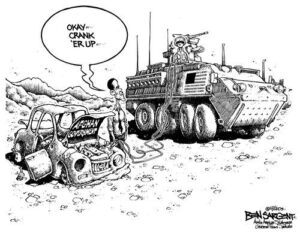
Then when the local government can’t repay the debts, Uncle Sam owns them just as the European powers did earlier. They can then take out of the country much more than they bring in.
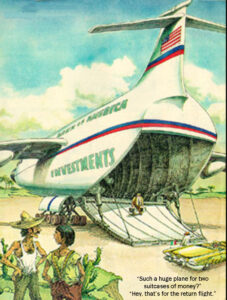
The rhetoric justifying the situation has the dominant power “assisting” to develop the indebted country’s fiscal practices and its industry.

That’s when the U.S. sends in it’s economists to apply the kind of shock therapy they used in a number of countries to increase foreign debt and and produce authoritarian outcomes.
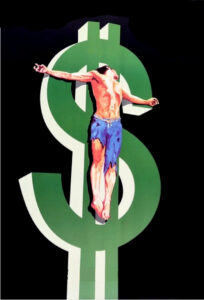
Colonel Lawrence Wilkerson would help prepare the UN speech for Secretary of State Powell making the dubious case for war against Iraq.
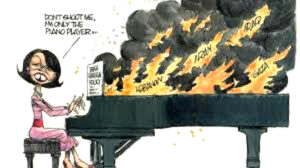
The US would claim the intent was to “disarm Iraq of weapons of mass destruction’, weapons it had stockpiled itself.
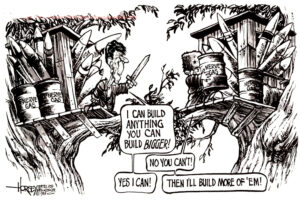
Colonel Wilkerson would describe succinctly the direction in which the U.S. had gone since 1945 leading to it’s dubious case against Iran: ‘The U.S. has become the law of the jungle, rather than the greatest supporter of international law and the rule of law in general across the face of the globe. America exists today to make war. All the national security state knows how to do is make war.
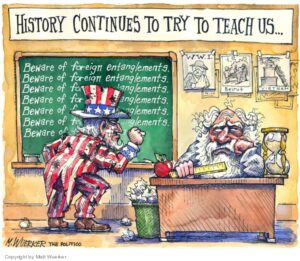
How else do we interpret 19 straight years of war and no end in sight? It’s part of who we are. It’s part of what the American Empire is. We are going to lie, cheat and steal, as Trump and associates and a host of other members of my political party, the Republicans, are doing right now. We are going to cheat and steal to do whatever it is we have to do to continue this war complex. That’s the truth of it. And that’s the agony of it.’
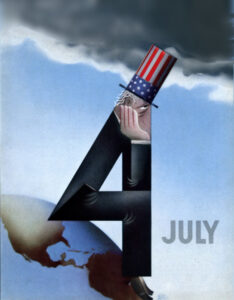
It certainly wouldn’t make the US a kinder, gentler nation as George H. W. Bush would say he wanted.
I came to view it as anti-democratic systematic war fare. A bugle tooting, chest thumping force of habit, a sordid nasty one. The Midas touch in reverse. When would they ever give it up?
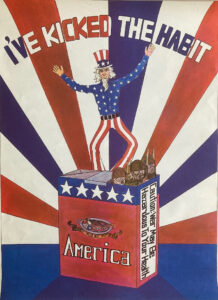
It seems every incoming president, clothed in immense powers, must recite a justificatory apologia: “I’m only saying and doing what all presidents before me said and did.’
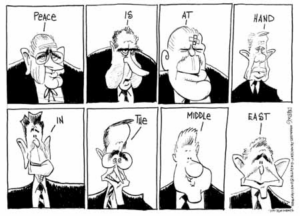
That’s who politicians and their backers are. That’s what they say. That’s what they do.
I asked Russel, ‘ How can politicians lie and kill so?’
He replied, ‘They cannot be otherwise. Let’s go back to an old fable of Aesop:’ A scorpion asks a frog to carry him over a river. The frog is afraid of being stung, but the scorpion argues that if it did so, both would sink and the scorpion would drown. The frog then agrees, but midway across the river the scorpion does indeed sting the frog, dooming them both. When asked why, the scorpion points out that this is its nature.”
In his U.N. address, President Obama would openly embrace this aggressive unilateralist military doctrine backed by previous administrations. Armed force beyond the international norm of self-defence would remain an option. Obama would hold to it when referring to the Middle East and that small matter, it’s oil.
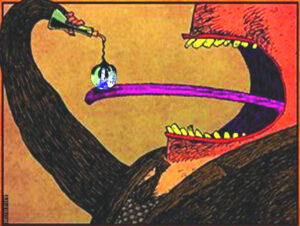
He would tell the world: “The United States of America is prepared to use all elements of our power, including military force, to secure our core interests in the region. We will confront external aggression against our allies and partners, as we did in the Gulf War. We will ensure the free flow of energy from the region to the world.”
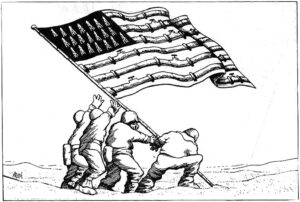
Obama would decree informally that he could pick out anybody in the world and, as prosecutor, judge, jury, executioner, and in secret, wipe that person out. He would take out the regime in Libya without a congressional debate, without a congressional authorization, appropriation of funds or declaration of war.
His rhetoric would not be that he had a dream, but that he had a drone.
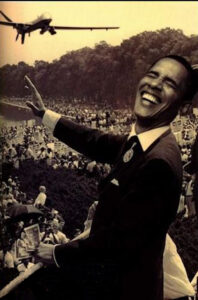
The aperture in those eyes in the sky got very, very broad.
Nowadays the military make video war: young men recruited in malls armed with joysticks don’t have to go to the frontline in another country to kill somebody . By triggering the drones dispatched they can take pot shots from an air-conditioned cubicle half a world away. The worst thing that can happen to them is carpal tunnel or spilling coffee in their lap.
There would be so many drones above the skies of Afghanistan , the people would start to see them as their national bird.
The big fat question arises as to what is external
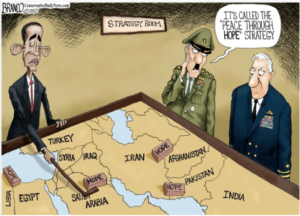
‘And what is internal.
As is the case on the Korean peninsula.
Surely people both north and south would see another round of nipponese military intervention as external.
And that their conflict is internal. They can work it out best by themselves.
Neither ruling group wants to or is capable of taking over the other.
They know each other too well.
Foreign Entanglements.
Illegal we do immediately; unconstitutional takes a little longer’.
Henry Kissinger
“You can’t let a country go communist because of the irresponsibility of its own people.
Kissinger on the U.S. support for overthrowing the democratically government of Chile.
Early in the 20th Century US forces were routinely dispatched to Mexico, Central America and the Caribbean. After World War II marines were sent back into the region,
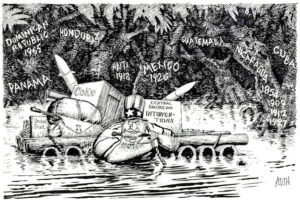
as well as further afield in South East Asia. There to fight the resistance to them, sure enough this grew from these devil dog leathernecks being there in the first place.
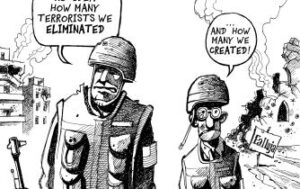
If the natives weren’t already restless, they would certainly become so.

And expected to like their occupiers. However rather than providing reassurance, a U.S. military presence can stoke resentment among local populations and their leaders, alienating the allies that bases were intended to reassure. By one count, since World War II, local populations in more than 30 countries have taken to the streets to protest the U.S. military presence in their backyards. Osama bin Laden would famously cite the presence of U.S. troops on foreign soil as one motivation for the 9/11 attacks.

The modern morality of international relations-a Wilsonian morality which the U.S. helped promote-does not accept the arbitrary exercise of power by the strong against the weak to get their own sweet way. It portrays itself as the global boy scout assisting little old countries across the road. Its narcissistic self-image is that of the light unto the world .
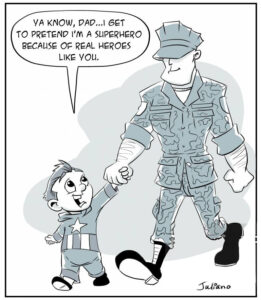
While starting on narrow interventionist actions like those of the colonial powers, it argued its own were ones carried out in the broader interests of ‘The Free World’.

Their motives were not to take over other people’s lands but simple, altruistic ones.
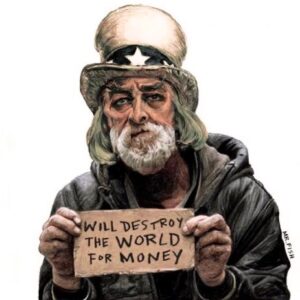
Particularly after World War II, U.S. officials tended to rank countries by a single measure, technology, and to express progress in terms of time. Rural, unmechanized countries were feudal, primitive, or backward while industrialized, Free World’ countries, like Britain, lived closer to their time zone, off by maybe a few minutes. Communism’s lumbering one-way march through history was an “alien time sense,” Life magazine explained.
Life magazine explained that Americans treated time like “raw material for whatever project is before us.”
The US felt it owned modernity along with the speed, energy and being on political heat of modern technology concomitant with it. It felt that it had a right to decide who lived in the future, and who in the past.
With the defeat of the Soviet Union the US would embark on a very aggressive policy of intervention and engagement in Western politics and Western elections. When it came to accusing Russia of intervening or influencing elections in the U.S., the American power elite would show it lives in a glass house. When asked by a journalist: ‘Have we ever tried to meddle in other countries’ elections?’ James Woolsey, former CIA Director would reply: ‘Oh, probably. But it was for the good of the system, in order to avoid the communists from taking over’.
For example, in Europe in ’47, ’48, ’49, the Greeks and the Italians, we—CIA—
‘We don’t do that now, though? We don’t mess around in other people’s elections, Jim?
‘Well, mmm, yum, yum, yum, never mind. Only for a very good cause. ’
In this prevailing foreign policy of containment, stopping Communism justified almost any brash action. Decided upon democratically of course.
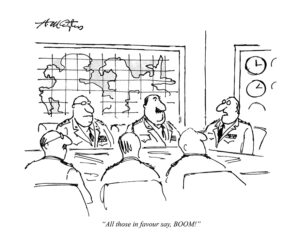
The US funded one size fits all, clandestine ‘liberating’ insurgencies in Guatemala, Cuba, Nicaragua and Angola. Their basic characteristics differ from that in Vietnam only in their scale and duration.
The disastrous Bay of Pigs invasion was what what the C. I. A. called a ‘perfect failure’.
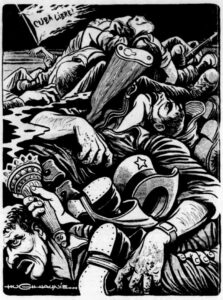
Kennedy gave the thumbs up to the surprise attack on Cuba by 1400 exiles. President Kennedy made a decision and the people around him supported it despite having their own doubts. Charging that Kennedy and Spellman were working together to overthrow him, Castro many have been a bit off the mark as to who were its leading architects. Spellman only came in as a backup.
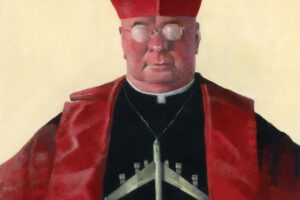
Nevertheless, the Church policy on Communism became braided with that of the new American administration. Bringing to bear their messianic views together to carry out a provocative act against what they saw as an atheistic non prophet monolith, these monotheists would come to great grief.
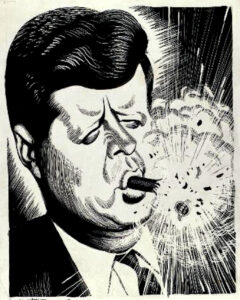
Poor intelligence compounded poor political analysis. Spellman believed he had as much authority as the Pope. He just didn’t have as many people who believed it. Despite strong evidence that Castro enjoyed wide popular support, his people having a higher standard of health and education than many in the US, Kennedy had become convinced that the Cuban people – many of whom were Roman Catholic – were just waiting to be liberated from the Communists.
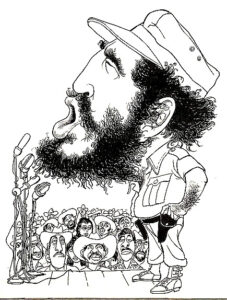
Instead the expeditionary force raised was expeditiously overwhelmed by Castro’s superior forces. One former CIA official later claimed to have overheard JFK liken his dilemma with Castro to the question posed by Henry II about Thomas a Becket.
Castro’s forces slipped the leash never giving back the casinos, racetracks and shrimp boats. Thus began a long period of hateful obsession with Cuba in which blowing up, poisoning or shooting the Cuban President became a priority.
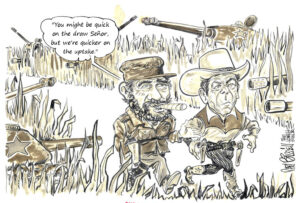
Any attempt to untie the tangled knot of US-Cuban relations would remain a long lasting problem.
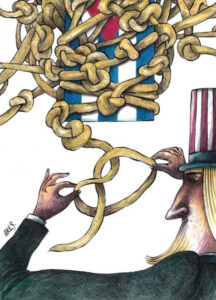
There you are. JFK was not the new Roland, his silver trumpet flashing in the sun, who had dazzled me with his appeal for renewed personal responsibility. Rarely had a new administration received such a sympathetic hearing at a personal level from the more serious and respected journalists of the day. Reporters who were well educated and who were enlightened themselves and worked for enlightened organizations, liked the Kennedys and were for the same things the Kennedys were for. JFK’s most famous speech as a senator was a 1957 one warning the French they were going to have to get out of Algeria. As President, he tried to reach out to a range of Third World leaders like Sukarno.
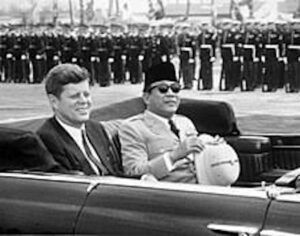
On a Hiding to Nothing.
‘.. . Ho had built the Viet Minh into the only Vietnam-wide political organization capable of effective resistance to either the Japanese or the French. He was the only Vietnamese wartime leader with a national following, and he assured himself wider fealty among the Vietnamese people when in August-September, 1945, he overthrew the Japanese… established the Democratic Republic of Vietnam, and staged receptions for in-coming allied occupation forces.. .. For a few weeks in September, 1945, Vietnam was—for the first and only time in its modern history—free of foreign domination, and united from north to south under Ho Chi Minh. .. .’
The U.S. Defense Department study of the Vietnam war, intended to be “top secret” but released to the public by Daniel Ellsberg and Anthony Russo in the famous Pentagon Papers case, describing Ho Chi Minh’s work.
It is important to set the war in a broad historical context.
About the French in Vietnam, John Kennedy had a more profound sense of the importance of the nationalism and of the importance of the colonial past. Privately he would have felt that Vietnamese resistance to French interests should have been seen as the end of the colonial era, not the start of a cold war. When the US initially intervened on behalf of the French, it fatally assumed an overlap between De Gaulle’s imperialist ambition and the US’s anti-communist paranoia. By the time Kennedy became President the French were well out of the picture having been routed at Dien Bien Phu. However Kennedy became locked into this false operating assumption.
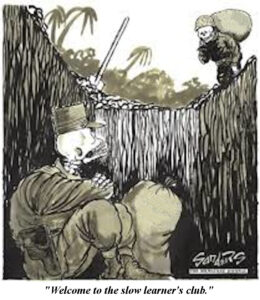
The reporters couldn’t imagine that men said to be the ablest, his governmental handmaids, would shape up to be architects of such a tragedy as Vietnam. They bumped up the number of Americans serving there, escalated the rhetoric and gave us the can-do dream team who turned it into an American war. They didn’t understand the difference between intelligence and wisdom, between the abstract quickness and verbal facility which their team exuded, and true wisdom, the product of hard-won, often bitter experience. That difference was clearly delineated in Vietnam, where soldiers, officials and reporters could see that the war was going badly even as McNamara brusquely wielded charts and crunched numbers to enforce his conviction that victory was assured. A clear inconsistency existed between Kennedy’s actions and his public discourse. There was an enormous gap between the image he projected and reality. As with his african american successor, while this paladin’s tongue was in the high flying clouds, his feet were in the muck. How much of that was him following the line and how much his own thought processes, we don’t know. Whatever the case, for me the spell of the technicolour Camelot was broken, it was plain. All the King’s horses and all the King’s men couldn’t put it together again. While the metropole was falling off the edge, The New Frontier turned out to be nowhere other than Vietnam.
‘You’re just the latest in a long line of people who’ve been taken in like this’, said Russel. ‘Hoodwinked. So too was it for Ho Chi Minh. During the war the precursor to the CIA had supplied his forces with arms and marvelled at how quickly they mastered their use.
In the post-war days he turned to the United States. He believed in the Declaration of Independence and studied the events leading to the American Revolution.
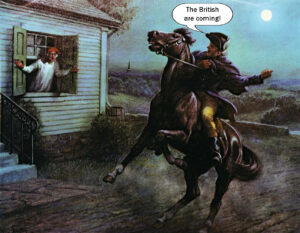
When he stood on a hastily-erected wooden platform opposite the French Governor-General’s palace with the flag of the new republic above him, so too was a group of American officers, led by Major Archimedes L. A. Patti of the Office of Strategic Services (OSS), the forerunner of the Central Intelligence Agency.
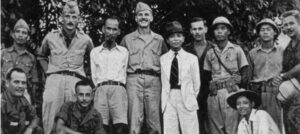
Major Patti described the ‘extraordinary pro-American spirit that was everywhere at the birth of Ho Chi Minh’s Vietnam’. ‘They didn’t regard America as an imperial power,’ he said. ‘They thought we were different from the Europeans and they were desperate not to be associated with international communism, not with the Chinese or the Russians, but with us in America. Ho Chi Minh liked Americans. He told his friend Wilfred Burchett, the Australian journalist, that he enjoyed ‘the openness of Americans . . . the way they get things done. They didn’t seem to be prisoners of the past, not like the French.’ Ho perhaps had a personal reason to like Americans. In June 1945 Life magazine published a family album-style picture of members of an American OSS team who had parachuted behind Japanese lines to supply the Vietminh. In the centre was Ho Chi Minh; on his left was a young American holding a pith helmet, Paul Hoagland, who had found the Vietminh leader seriously ill and had nursed him with sulphur drugs and quinine. Ho himself later acknowledged Paul had saved his life.
Ho Chi Minh was pragmatic and flexible,’ said Russel. ‘He’s the antithesis of other emerging Communist leaders in one respect: he wants his people to open themselves out to other societies, Communist, capitalist and non-aligned. Like Tito in Yugoslavia, well aware of the tenuous and highly conditional nature of Soviet ‘friendship’, he knows that this is the only way his people can survive as a national entity. Indeed, so anxious was Ho for American support for his fledgling republic that he addressed a number of separate appeals to President Roosevelt and to his to his Secretary of State. Major Patti later wrote that Ho ‘pleaded not for military or economic aid’ but for understanding, for moral support, for a voice in the forum of western democracies. But the United States would not read his mail. He wrote several letters to Truman requesting aid for his country to stave off mass starvation. The French had seized and tucked the supplies of rice away. Truman never replied. The DRV Government was not recognised by the United States and it was considered ‘improper’ for the President or anyone in authority to acknowledge such correspondence.
Gradually the U.S. Built up it’s military presence in Vietnam.
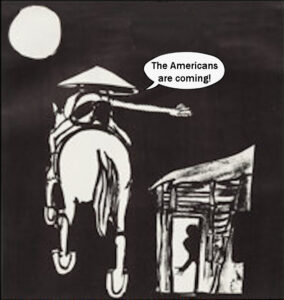
Ho Chi Minh had seen America’s post-Second World War strength as a counterweight to China and went so far as to propose that Vietnam should be part of an ‘American Commonwealth’ in Asia with a trusteeship status in line with that of the Philippines.’
‘Just like our’s,’ I said, regretfully, only half-joking.’
‘That the Philippines then was effectively an American colony apparently did not concern him; for this was an expedient. Unless Vietnam survived in the shadow of the most populous nation, independence would never be realised. Ho Chi Minh told an American journalist: We apparently stand quite alone…. We shall have to depend on ourselves.’ He was forced to accept the formal ties and material assistance under offer from the Soviet Union and especially from China. While the US of A financed the French.’
‘And taken over from where the French left off before taking on the Algerians.’
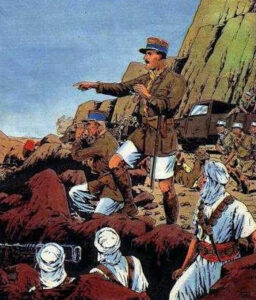
‘The French are dazzled on Bastille Day by the fly past, those immaculate displays of formation with red, white and blue smoke streaming behind military aircraft. They love to cheer their veterans of the wars against the Vietnamese and Algerians parading down the Champs Elysee towards the Arc de Triomphe. The usual representatives from all branches of the French armed forces plus the seasoned representatives of the French Foreign Legion who as usual steal the show with their beards, axes, brown aprons and funereal paced marching. They forget what they did to these people.’
‘The heads and limbs those axes lopped off. The blood stains that covered those butchers’ aprons. The many funerals their victims attended.’
‘As sure as God made little green apples we’ll see the U.S.A. take over the fight against the Arabs one day. They can’t seem to learn from the mistakes of others. It’s been said war is God’s way of teaching Americans geography,’ said Russel.
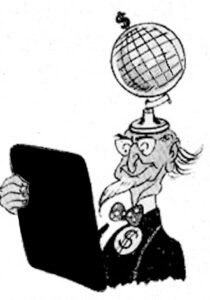
‘Drums rum-tum, full of yankee doodle dee dum, forging never ending fubar wars to save people from themselves.’
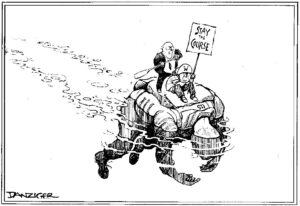
‘‘For citizens of such a huge country the Americans seem to have a very restricted, insular outlook on the world.
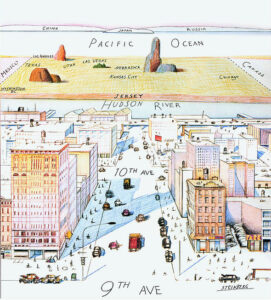
What part of the globe has topped their list in geography studies?’
‘Their own Americocentric backyard and ward. In Latin America.
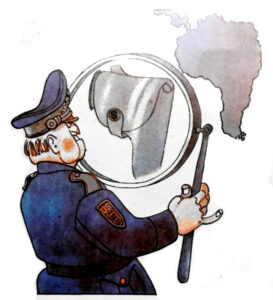
At the end of the War, their government and ours told us that fascism had been defeated once and for all.

They told us that all war criminals would be punished for their crimes. Neither of these assertions turned out to be true. Our rulers entered a maze of moral hypocrisy. They used Nazis and war criminals to fight against what they saw as the threat of Communism and shape the world we live in today.
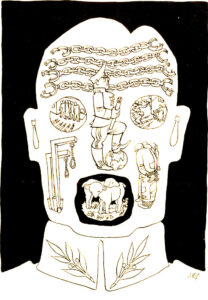
The darkest corner of this dark enterprise was the use and protection of men whose expertise was simply the hunting down and destroying of other human beings. They recruited Nazi criminals firstly in Europe in their clandestine war against Communism and then helped them transplant these special skills and unwavering ideology from Europe to Latin America.’
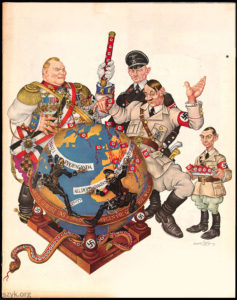
‘This is stranger than fiction. How could they justify this?’
‘They took to heart the adage that my enemy’s enemy is my friend.’
It fell to such critics as William Fulbright to show how the U.S. had lost its perspective about its place in the world, lost sight of the relationship between ends and means. From his position as Chairman of the Senate Foreign Relations Committee, Fulbright voiced his dissent from this unthinking American foreign policy based on instinct and drift. He diagnosed his country’s illness and its “arrogance of power”. He spoke on behalf of those who wanted Congress to have a greater lock on presidential power to make war.
During the Cold War period following World War II, Senator Fulbright advocated accommodation with the Communist countries. He spoke out against the Bay of Pigs invasion of Cuba in 1961 and the armed intervention in the Dominican Republic in 1965. He revealed the extent of losses resulting from Nixon’s secret bombing of Laos and Cambodia.
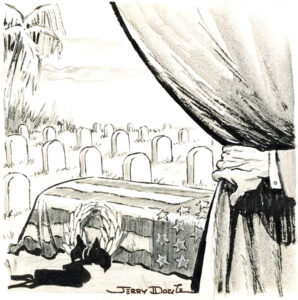
The US goliath would go on to engage in massive electoral intervention in Chile in the 60s and Nicaragua in the 80s. It would fear the Chilean government nationalising the copper industry.
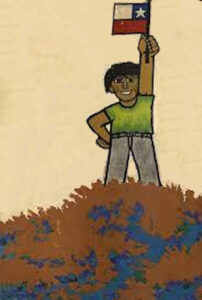 It would support the fascist coup against Allende’s democratically elected government, fearing ‘one rotten apple might spoil the barrel’.
It would support the fascist coup against Allende’s democratically elected government, fearing ‘one rotten apple might spoil the barrel’.
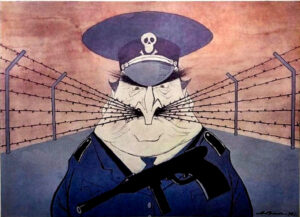
Their work installing military dictatorships in Indonesia and to some extent in Cambodia in 1970 proved invaluable. Like Suharto, Pinochet would act out the duplicitous role of posing as a defender of the constitutional status quo, while in fact moving deliberately to overthrow it. In Argentina it would back the ‘Dirty War’. To spread democracy and truth it’s intelligence agents busied themselves fixing elections and hiring local journalists to plant stories.
Feeling itself the only show in town these days, it confronts what the Pentagon calls an “arc of instability” that stretches across the world, one it has largely created. To do so it employs financial pressure and economic blockades as well as bombing to bludgeon nationalist governments into submission. It constantly rails against dictators unless of course they’re working for them.
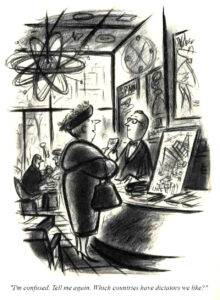
Tyrants, torturers, killers, and sundry dictators and corrupt puppet-presidents have been aided, supported, and rewarded handsomely for their loyalty to US interests.
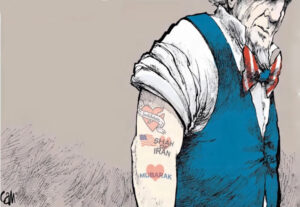
Clearly, there is mission creep in what it is doing. It’s doing it because it can. It’s allowing it’s capabilities to drive it’s policy, instead of the nation’s laws and values to constrain it’s capabilities.
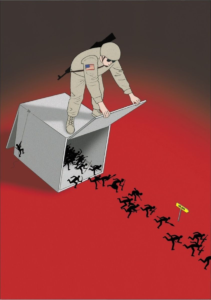
General Wesley Clark, who would go on to become the supreme allied commander of NATO during it’s bombing of Yugoslavia heard about a memo that said the U.S. planned to take out seven countries in five years, starting with Iraq.

Then would follow Syria, Lebanon, Libya, Somalia, Sudan and, finishing off, Iran.
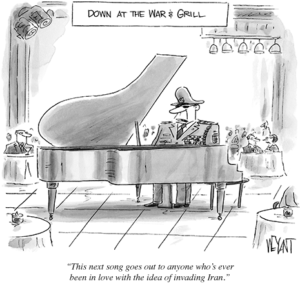
At the time it was feared there was a terrorist behind every Bush.
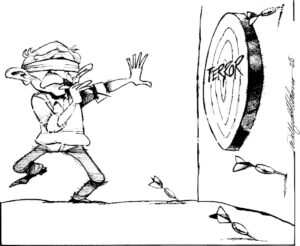
General Clark reported hearing: “I guess if the only tool you have is a hammer, every problem has to look like a nail.”
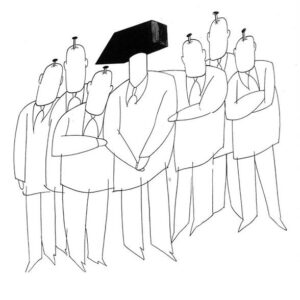
Lebanon would be the first time that U.S. soldiers were engaged in combat against Arab nationals on Arab soil, the first time that a naval and aerial bombardment of Arab villages and military positions was ordered by U.S. commanders.

It was the first time that Americans fought a myriad of militiamen like those of Amal, Hezbollah and the PLO.
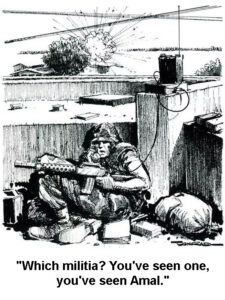 Yet as the declining empire attempts to work through the row of nails, it’s still unable to quell resistance pushback throughout the entire Middle and Far East simultaneously. Those pesky rogue states won’t let them rest.
Yet as the declining empire attempts to work through the row of nails, it’s still unable to quell resistance pushback throughout the entire Middle and Far East simultaneously. Those pesky rogue states won’t let them rest.
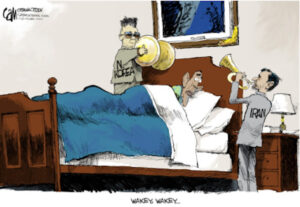
They’re playing a kind of global whack-a-mole, where they stamp out self-declared Islamic terrorists in one place, and they pop up somewhere else. ‘Hammerhead’ takes away territory they control, and they re-emerge as a more traditional terrorist operation, attacking people wherever. The American people declined the cup of Kool-Aid as Syria’s turn came but still force fed. Kissinger would keep trying for another 9/11 as in Chile. ‘Hammerhead’ has become mired in military quicksand dragging it deeper as times passes. So what else’s new?
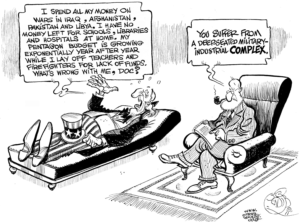
As Gentle as a Lam.
Born into the maelstrom of the war between the French and nationalist Vietnamese forces, Ngo Van Lam a quiet conscientious student I befriended, appreciated the peace and quiet of rural New South Wales, as a place to read economics, the only subject in which two people can share a Nobel prize for saying opposite things. ‘If all economists were laid end to end, they would not reach a conclusion,’ was how Professor Belshaw put it.
Unlike today, Vietnamese in Australia were few and far between. I went easy on this gentle scholar, content to get to know the general outlines of the geography and culture of his country. Gradually I began to broach what was bound to be touchy territory. The war that was waging in his country and that was now drawing in our own troops.
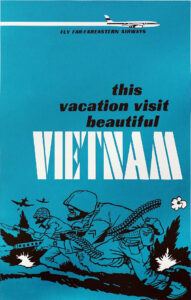
I was aware it would be hard to reach a conclusion with him but I was determined to try. To get to study in Australia, Lam would have had to have been vetted so I could expect him to somewhat circumspect. Using a religious metaphor, I took him – coming from a country where All Saints Day is officially observed – to be familiar with, I invited him to look upon me as the Devil’s Advocate for the sake of argument. In the same spirit the Church’s official sceptic worked over one’s candidacy for sainthood, so too I would examine the worthiness of the Republic’s candidacy as a military ally to which we should commit our troops. In taking this position in a very profound matter, I made it clear I did not necessarily hold with it. Lam drew the job of making the opposite argument in favour of military support on the same basis. With him as God’s Advocate our contact proceeded something as follows.
GA: “The Republic of Vietnam is fighting to build a democracy in which everybody is free to choose the government.’
Hopefully a more robust one than ours. We can’t stop the spread of Communism by sacrificing the principles of democracy.’
‘The Communists want to fool you into believing they have greater popular support.
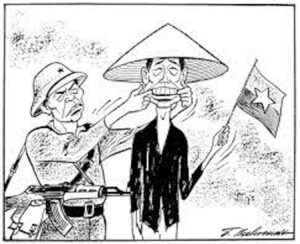
They are waging a war of terror against this attempt.
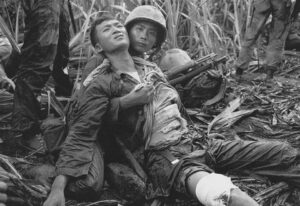
We need support to repulse them and to stop them hurting our soldiers.

DA: “What you appear to have is a military dictatorship. President Diem himself was ‘lifted’ and ‘sandbagged’ in 1963.
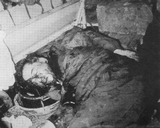
‘Don’t think for one moment because the world’s focus is on what the Americans are doing that the VC have clean hands.’
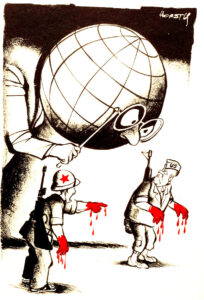
‘If the US were not there the amount of bloodshed wouldn’t be so astronomical. The military have been in charge since with a series of coups”.
GA: “Sin loi-excuse me. They had to step in to stop the corruption and breakdown in law and order. We have a saying, ‘A house leaks from the roof on down. ’ From the top down to every echelon palms are greased. The situation has now stabilised since Marshal Ky took power”.
DA: “Much of the corruption comes from war profiteering, a consequence of the massive U. S. support. It creates a false economy utterly dependent on American presence becoming perpetual.
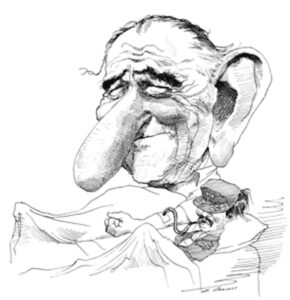
It creates a situation in which military men like Marshal Ky can come to power and put down any opposition. He says that in a democracy he is free to take military action against whosoever he wishes.
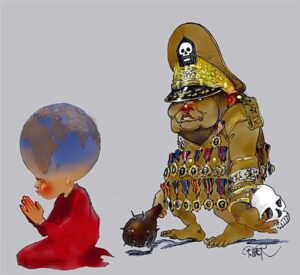
How can he justify this?”
GA: “Marshal Ky is a military man who shoots from his mouth. Diem was a hopeless mystic. We are still looking for the right leadership. We are still drawing up the rule book for democracy. We can’t do this while our nation is threatened and undermined by the Communists. They attack our troops without warning.
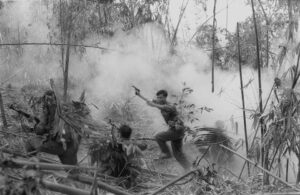
They use any available means to demoralize and intimidate people”.
DA: “The Communists are ruled by a civilian politburo. Isn’t it better to have the military under the thumb of the civilian authority?’
GA: ‘You’re ‘dinky dau’-off your rocker. Communism is an immoral authority that wants to curtail our religious rights. They forced a mass exodus of Catholics from the North. Cardinal Spellman came to offer his blessing to these refugees.
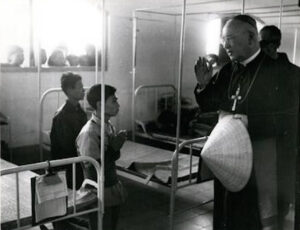
DA: “Yes, and to offer cash grants to those Catholics who would fill Diem’s southern power base while leaflets were being dropped from planes, proclaiming that “Christ has gone to the South” and “The Virgin Mary has departed from the North.” Listen, I’m dinky-di. The Communists associate Catholicism with the oppressive French rule, with those who creamed off the land’s bounty, with those who collaborated with the French, the Japanese and now the Americans. They associate the Church, the largest landowner in Vietnam, with an elite whose members are at the top of the tree. It so happens many of the majority Buddhists sees things this way too. The Republic has refused to abrogate many of the anti-Buddhists laws passed by the French. When protesting they have been mowed down in the streets. They lay down their lives with the same determination as the Communists. What you are doing is linking Communism – which has little place for religion in its ideology – with famously pacifist believers, in a greater push to remove foreign control. How can you uproot such a resistance?”
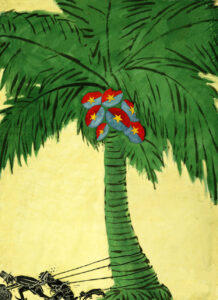
GA.: ‘Miracles can happen. With more support from friendly countries we can create the conditions for a prosperous market economy and stable society just like Australia’s. The impact of the war has disrupted the ancient patterns of Vietnamese life. The cities are crowded to bursting point, people uprooted from the land and the ancestral values of a rural society. They have found nothing to replace them. Half our internal refugees have no permanent shelter. Contagious diseases are a constant threat. Hungry children roam the streets, scavenging and begging, searching for jobs to do or pockets to pick. Women from the country have become bar girls and prostitutes. For all our problems Saigon is filthy but free. Demonstrations are held denouncing the corruption and demanding religious freedom and better treatment for veterans. This is what I try to defend.
Choi oi-good heavens, perhaps there might be some political and economic breakdown in Russia or China leading to less support for Ho Chi Minh. Who knows what might happen? God moves in mysterious ways”.
DA: “So too does Charlie. Pin him down in elections, not in firefights. According to the Geneva Accord Vietnam’s division was a temporary measure – just like the buildings in this college. Acting more like master than ally, against the caution of the Americans, their desire for him to offer the Buddhists concessions, Diem raised many questions about the democracy he was selected to be centrepiece of. Unable to clean up his act he acted harshly, ruthlessly, mirroring the techniques of the Hanoi regime. Even Cardinal Spellman dropped his support for him. Diem rejected outright the idea of re-unification elections. A case of the tail wagging the dog, he claimed elections were impossible to hold in Communist controlled areas. I saw his ghastly sister-in –law Madame Nhu telling an American television reporter, ‘Vietnam has no use for your crazy freedoms. ’
The dragon lady accused the self-immolating protesting Buddhists of using imported petrol, offering to provide the matches to ‘barbeque’ more. By foolishly seeking autocratic power, by riding the back of the tiger, Diem ended up inside it.
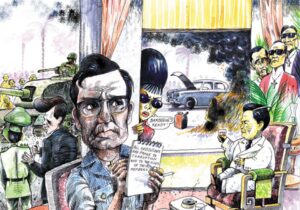
‘No Nhus is good news’ was one American response. Since then over eighteen months you’ve had eight governments. One of Johnson’s aides has suggested a new symbol for your republic: a turnstile. Many question how such instability can lead to victory.
Might it not be that the regime whose populace has fewer doubts and asks fewer questions will prevail. ’
Eventually both sides will have to thrash out their differences without hostilities. Otherwise your argument as to the Republic’s special need has more holes than Diems bullet ridden body”.
In this two hander with the devils advocate, we were able to clarify and articulate our positions on the conflict in a respectful fashion. This holy communion whetted my appetite for finding out more about our teeming volatile neighbours, first-hand.